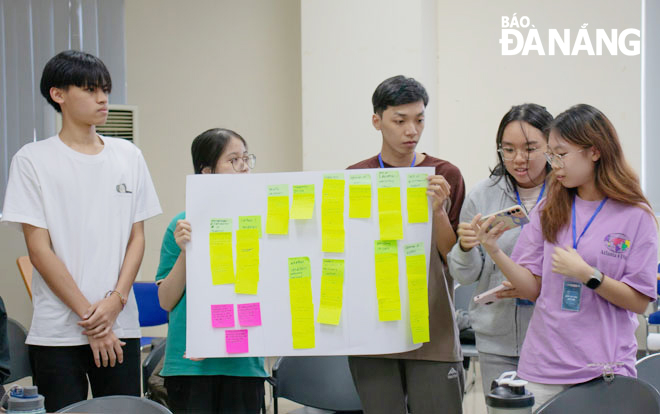Da Nang students develop fine dust reduction solutions for Non Nuoc Stone Carving Village
After two days of conducting field surveys in the Non Nuoc Stone Carving Village located in Ngu Hanh Son District, Da Nang, 60 students participated in the 7th Edition of the Learning Express (LeX) Program which was co-organized by the University of Science and Technology under the University of Da Nang, and Singapore Polytechnic School has created a number of fine dust reduction solutions in a bid to protect public health.
 |
| A group of students discussed solutions and ideas for fine dust control in the Non Nuoc Stone Carving Village. Photo: K.N |
Nguyen Manh Chien, a student at the Faculty of Advanced Science and Technology of the University of Science and Technology, said that through observing in the Non Nuoc Stone Carving Village, the student group realised that fine dust is among air pollutants generated by sculpture facilities while artisans are cutting stones to create embryos, or grinding stones to create their products.
Fine dust not only pollutes the environment but also affects public health. The fine dust particles are inhaled and eventually deposit in the pulmonary alveoli, causing chronic lung disease, heart disease, and even cancer. Fine dust is considered the most important environmental risk factor for health, and a major cause of illness and premature death. Fine particulate matters are an especially important source of health risks, as these very small particles can penetrate deep into the lungs, enter the bloodstream, and travel to organs causing systemic damages to tissues and cells. Therefore, health and environmental effects of fine dust have become an urgent issue that needs to take actions to address air pollution.
|
"The Learning Express (LeX) program with Design Thinking skills is a modern and reliable educational model for students, thereby, providing students with both knowledge and real-world skills in an attempt to improve their capacity and promote their willingness to contribute to their local communities. Participating students are divided into groups in a bid to encourage them to apply their knowledge and skills to real world tasks in craft villages. Based on their survey results, the student group applied Design Thinking skills to develop their ideas, and solutions that can be used in real world." Said Dr. Nguyen Hoang Trung Hieu, the Deputy Head of the Department of Science, Technology and International Cooperation of the University of Science and Technology. |
Based on their survey results, the student group proposed to design a device that vacuums dust and reuses the amount of used water to reduce machine cutting temperature during the stone grinding and cutting process. The device works like a vacuum cleaner, and its nozzle can be attached or removed, so that it can be placed near workers while they are working, or the flexible nozzle can be used to clean the production facility.
Chien said that in addition to the fine dust collection function, this device can filter used water. The mixture of dust, finer or small particles will pass through the filtration system to produce clean and safe water for reusing purpose. Filtered water can be reused or used for clean-up operations and watering plants. The amount of dust from the device will be reused as raw materials for casting products, brick and cement products, and more.
Huynh Ho Huy Hoang, another member of the group, said that to be able to join the LeX program, he must pass the selection processes in terms of foreign language skills, learning skills and problem-solving skills. From the above-mentioned mandatory factors, participating students get motivated to conduct research and achieve academic sucess. Furthermore, Hoang has an opportunity to improve his team coordination’s skills, and boldly make suggestions to develop products that benefit the community.
During their survey, the student group has also active in raising public awareness about the health effects of fine dust, and effective ways to reduce air pollution.
Dr. Nguyen Hoang Trung Hieu, the Deputy Head of the Department of Science, Technology and International Cooperation of the University of Science and Technology, said that the student group's dust pollution reduction solutions have received strong support from local communities and local authorities, thereby opening up new directions for protecting the environment and public health. Hopefully, with close coordination between relevant local agencies, this solution will soon be deployed and widely used in the real world, thereby contributing to significantly reducing fine dust pollution in the Non Nuoc Stone Carving Village and similar industries.
Reporting by KY NAM – Translating by H.L